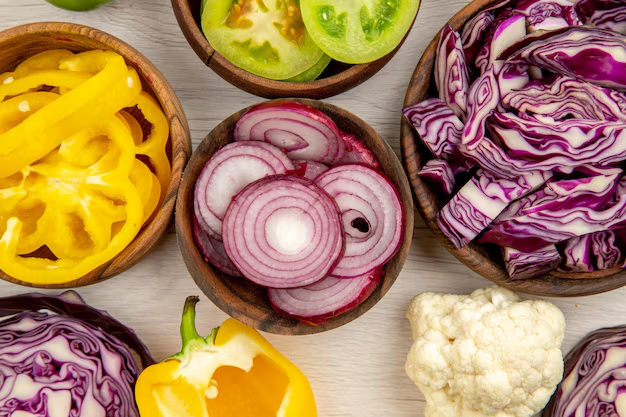Do Onions Stay Fresh in the Refrigerator? A Comprehensive Guide to Keeping Onions Fresh
Have you ever opened your refrigerator to find a half-used onion sporting a fuzzy coat of mold or an unpleasant odor that makes your nose wrinkle? Onions are a staple in many kitchens around the world, but knowing how to store them properly can mean the difference between flavorful meals and a waste of money. While the refrigerator is a go-to for keeping foods fresh, you might wonder: Do onions go bad in the refrigerator? Let's dive deep into this topic and explore the best practices to ensure your onions remain fresh and ready for your next culinary adventure.
Understanding Onion Varieties
Types of Onions and Potency
Before considering storage methods, it's essential to understand the different onion varieties. Yellow onions are often used for cooking due to their balanced flavor, while red onions are a favorite in salads for their mild taste and color. White onions are typically sharper and crisp, making them ideal for salsas. Each variety has distinct characteristics that affect how they should be stored.
Impact on Storage
The type of onion can influence how you should store them to maintain freshness. Yellow and white onions tend to have a longer shelf life compared to red onions when stored under appropriate conditions. Understanding these nuances can help you devise a strategy for optimal storage.
The Science Behind Onion Storage
Onions and Humidity
Onions are a dry, dense vegetable that prefers a dry environment. Exposing them to the high humidity found in refrigerators can lead to quicker spoilage as moisture promotes mold growth and turn them mushy.
Temperature Sensitivity
While cool, dark places are usually recommended for storing onions, the cold environment of a refrigerator can be too cool for whole onions, causing them to become soft and lose flavor. For cut onions, however, the refrigerator can help extend their usability for a few days when stored properly.
How to Store Whole Onions
Ideal Conditions for Whole Onions
Whole onions should be stored in a cool, dry place with good air circulation. Pantries, cellars, or basements are excellent choices as long as they are not too humid.
Key Tips for Storage:
- 🧅 Avoid refrigeration for whole onions unless they are reacting to overly warm temperatures.
- 🌬️ Ensure ventilation: Use a mesh bag or a basket to allow air circulation.
- 🌡️ Keep them dry by making sure they're not in contact with overly moist surfaces.
Why Avoid Refrigeration?
The refrigerator's humidity can cause onions to spoil faster. When placed in moist conditions, onions can sprout, grow mold, or absorb moisture, all leading to degradation.
Storing Cut or Peeled Onions
Refrigeration is Key
Once an onion is cut or peeled, refrigerating it is the best way to maintain freshness. The cool temperature slows down microbial growth, extending the onion's usability.
Tips for Storage:
- 🧊 Use airtight containers or resealable bags to minimize exposure to air.
- 🛑 Keep them away from strong-smelling foods as onions can absorb other odors.
- 🔪 Plan to use them within 7-10 days for the freshest taste.
Handling and Maintenance
Avoid slicing more onion than needed to reduce waste and prevent the onion from drying out. If an onion develops an off smell or slimy texture, discard it to prevent contamination.
Common Misconceptions About Onion Storage
Do Cold Onions Minimize Tears?
One popular kitchen tip is to refrigerate onions before cutting to reduce tears. While the cold might slightly lessen the intensity of onion fumes, it's not a foolproof method and could cause unnecessary spoilage if left too long.
Freezing Onions: A Viable Option?
Yes, onions can be frozen! However, freezing alters their texture, making them best suited for cooked dishes rather than fresh applications.
A Summary of Onion Storage Tips 🧅
Here's a quick breakdown to ensure you're storing your onions for maximum freshness and flavor:
- 🏠 Whole Onions: Prefer a cool, dry, and dark storage location. Do not refrigerate unless necessary due to temperature concerns.
- 🧊 Cut/Peeled Onions: Store in the refrigerator in airtight containers. Use within 7-10 days for best quality.
- ❌ Avoid Moisture: Moisture is the enemy of onions in storage. Keep them dry, whether they're whole or cut.
- 🥶 Freezing: Use frozen onions in cooking; they're great for soups, stews, and casseroles but not salads or sandwiches.
Related Topics and Practical Usage
Picking Quality Onions
Selecting fresh onions at the store plays a vital role in how long they last. Look for onions that are firm, have dry and papery skin, and no holes or dark spots.
Repurposing Onion Scraps
Unused onions or peels can be composted or used to create vegetable stocks, reducing waste and adding flavor to home-cooked meals.
By understanding and applying these storage methods, you ensure that onions maintain their flavor, nutritional value, and longevity, reducing waste and enhancing the quality of your meals. Whether you choose to store them in a cool pantry or the fridge, these strategies will help you get the most out of your onions and keep your cooking fresh and flavorful.

